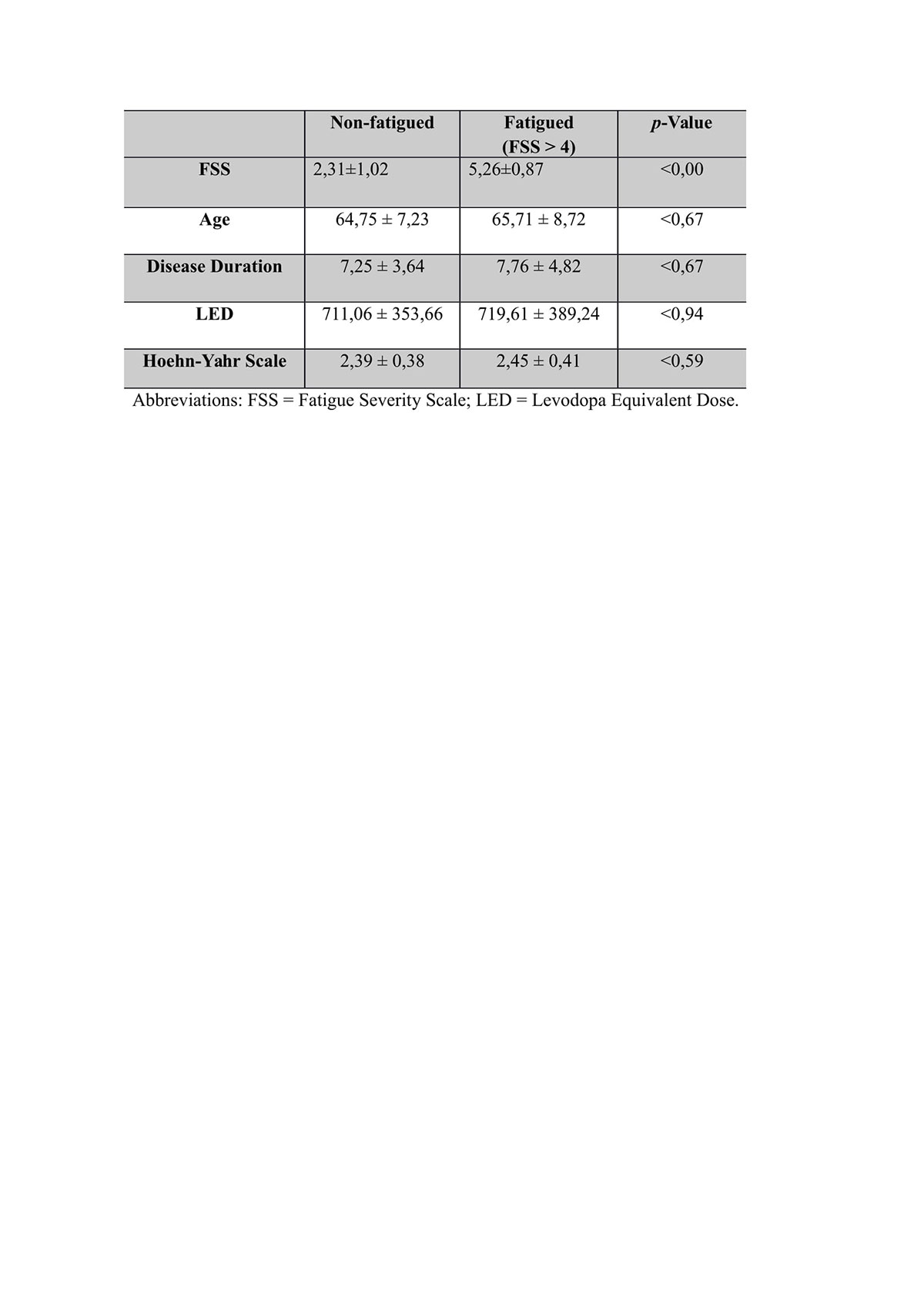Session Information
Date: Wednesday, September 25, 2019
Session Title: Non-Motor Symptoms
Session Time: 1:15pm-2:45pm
Location: Agora 3 West, Level 3
Objective: Identify the presence of fatigue in a population of PD patients, establishing its association with disease duration and treatment.
Background: Fatigue is one of the most common and most disabling symptoms among PD patients and has a significant impact on their quality of life [1,2,3].
Method: This was an observational and cross-sectional study conducted in a movement disorder center in Pedro Ernesto University Hospital, Rio de Janeiro, Brazil. This study randomly recruited outpatients aged between 50 and 85 years-old with a confirmed diagnosis of idiopathic PD. Exclusion criteria included the following: dementia, any clinical condition related to fatigue, Hoehn & Yahr scale ≥ 4, medications associated with fatigue, including hypnotics, beta-blockers, benzodiazepines, muscle relaxants and anti-histamines, depressive symptoms, defined as scores > 19 on Beck Depression Inventory-II, excessive daytime sleepiness, defined as scores > 10 on Epworth Sleepiness Scale and apathy, defined as scores >14 on Apathy Scale. Patients were submitted to Fatigue Severity Scale (FSS) and those with score > 4 were considered to be fatigued. Disease duration and levodopa equivalent dose were assessed in all patients.
Results: A total of 237 PD patients were screened and according to exclusion criteria 184 patients were excluded, remaining 53 (22,36%) patients. All 53 patients completed the FSS and of these, 21 (39,62%) reported distressing fatigue (FSS > 4), with FSS score 5,26±0,87 compared to 2,31±1,02 (p<0,00) in non-fatigued patients. Comparisons between patients with fatigue vs those without fatigue showed that patients had the same age (64,75±7,23 vs 65,71±8,72, p<0,67), disease duration (7,25±3,64 vs 7,76±4,82, p<0,67), Hoehn & Yahr scale (2,39±0,38 vs 2,45±0,41, p<0,59) and levodopa equivalent dose (711,06±353,66 vs 719,61 ±389,24, p<0,94) (table 1).
Conclusion: Fatigue is an independent PD symptom, existing without the presence of confounding factors. It is was not associated with disease duration and levodopa equivalent dose,
References: Nassif DV, Pereira JS. Fatigue in Parkinson’s disease: concepts and clinical approach. Psychogeriatrics 2018;18:143–50. Friedman J, Friedman H. Fatigue in Parkinson’s disease. Neurology 1993;43:2016-2018. Friedman JH, Beck JC, Chou KL, et al. Fatigue in Parkinson’s disease: report from a mutidisciplinary symposium. NPJ Parkinsons Dis 2016;2
To cite this abstract in AMA style:
D. Nassif, J. Pereira. Fatigue in Parkinson’s disease and its relation with disease duration and treatment [abstract]. Mov Disord. 2019; 34 (suppl 2). https://www.mdsabstracts.org/abstract/fatigue-in-parkinsons-disease-and-its-relation-with-disease-duration-and-treatment/. Accessed April 21, 2025.« Back to 2019 International Congress
MDS Abstracts - https://www.mdsabstracts.org/abstract/fatigue-in-parkinsons-disease-and-its-relation-with-disease-duration-and-treatment/

